- Home
- J. -H. Rosny aîné
The Navigators of Space Page 10
The Navigators of Space Read online
Page 10
II. Anthem
His thinking about things wandered within an appeal to atoms, an unfurling of branches and tiny creatures drying their downy feathers, Unease still trembling on the fringes of the cloud. The metaphysics of the Ephemeral emerged from the quivering of moist earth, the semi-desuetude of leaves, in all the relativities and pauses of Dream and the Psyche, the Babel of colors, the reflection of light from grass, the attitudes of hills, the softness of clay and the firmness of stones—and the suggestion of the Absolute became transparent as merely a profound gap hollowed out within nimbus clouds.
Standing on the old inexhaustible Earth, Luc dreamed that the moment had been improvised for him, that it was for him that the Mother would devour tomorrow without scruple, but in him that she had determined, after countless attempts, that the vicissitudes of Force should be inscribed, corresponding to the stages of the amorous matter of Being.
He was tired of studying. Print, the black and white of pages, still floated before his eyes, providing slight distraction from an inclination to solitary, random speech: a reaction to silence and congestion—the restitution, reconstruction and combination of ideas accumulated under too much tension in his skull.
“I am one of those, Mother, for whom you are always present, of those who reassimilate you perpetually in the palingenesis of the Ideal…of those who believe that no originality can increase without your contemplation.”
As skiffs of slate bore away earthenware clouds, opening an embrasure to the huge setting sun: “The Trinity left ajar in the margins of Dogma is you, Sun, Earth and Moon, who—after billions of changes of course, every movement lost in an infinity of orbits like a note in a symphony, after phases in which the twenty-five thousand years of the Precession are a bubble in a marsh—have created my humble ecstasy!”
As happens after too much reading, Luc was possessed by a tender electricity, a mystical bliss. Kneeling down, he intoned something analogous to the ancestral psalms, but orientated in a different direction: “Thank you, vibrations of the sunlight, geometry of organisms, cryptogams struggling through vicissitudes, inferior animals, prehistoric ancestors, all of you who have labored for life, all of you who have run through the eternal hour-glass!”
The words emerged, borne by a melancholy voice, clad in crepuscular charm, while Luc’s eyes grew languid and his breast seemed full of extraterrestrial charm.
A soft repetition continued within him, accompanied by emotion drawn from the finest nervous cords, the mysticism of the old European animal returning to the great Mother after centuries of Idolatry.
He was leaning forward, nourished by the transformation of clouds, a mirror of the ambiance, a microcosmic human in which an entire nocturne of the vast musician was duplicated. He seemed to be drinking in the evening electricity, the nervous and drowsy atmosphere, a thousand inductions inverted by the departure of the Star, a thousand new polarities over the vegetable and the mineral.12
Small creatures were emerging: crane-flies, crepuscular moths and, already, the silent, fleecy silhouette of bats, imbued with a charming mystery. Luc adored their furtive flight, their life restricted to an hour of penumbral nourishment, their equivocal nature, mammalian tending to avian, rough-hewn by nature with a mysterious objective, a delicate sketch that horrifies us only by virtue of its abortion.
“I love to think about your wings, little disinherited bats, so delicate and tactile, so electric that they have become eyes, perceiving objects at a distance. I love to dream about you, sleeping through the winter in your dark retreats, your lethargy saving up your meager lives during the glacial days…the days devoid of insects!”
Long-eared bats went back and forth, more jerkily than swallows, but more harmoniously than the common run of perching birds. Luc was daydreaming lethargically.
“Old Demoiselle Duhennin…her jaundiced cadaverous face…who made us tremble as she offered us marzipan…one day they put her in her coffin…Knock knock! Old Brother Duhennin mimed the scene admirably…well, it was doubtless an atavistic return…a bat or a marmot reincarnated in Mademoiselle Duhennin…and deep down? An isolation…an electrical state separating a life from the environment and conserving its vital charge?”
From the distant slopes on the horizon, blurred animals, cattle or horses, made an impression on Luc’s retina. His sensitivity took possession of them in order to complicate his dream.
“Bos in Aegypto etiam numinis colitur…dear Pliny!13 How gentle was your gravity, your belief in animal religions…your elephants descending from the forests of Mauretania to the banks of the Amilius to adore the rising moon. What did you think about lethargy and electricity? ‘When friction has dispensed life and heat to it, it attracts wisps of straw….’ The humble infancy of the terrible force! There was already, it’s true, the mystery of lightning, but so distant…in the depths of the Roman firmament, where the augur’s eye roamed…”
The hymn became complicated in the depths of the Tabernacle. On the trees, tormented by autumnal necrosis, there were tremors of iridescence and light crystals everywhere. From polished sulfurs, half-way to the firmament, gem-like salts and basins of Tyrian purple, Luc constructed creatures as light and ephemeral as the dusk, Forms living for an hour among the Alleghenies, the Carthages and Lake Arals that the wind and the light composed and decomposed, while he murmured, with a smile that “they are the children of the sines of the angles of incidence and the angles of refraction!”
He saw them, light, undulous and feminine, in the faces of eider-down clouds, in the sashes of pale green silk trailing in the distance over a gulf, in the translucent tresses of the ashen spiral floating over the incarnadine river of the occidental base.
“Day by day, the fluid monster was entangled by the humble chains of experience. Rude and barbarous at a remove of three generations, brutal in the Leyden jar, it was disciplined and stolen by the delicate work of the Voltaic pile, the disintegrator with countless fingers and prodigious reconstructor. Finally, it suppressed space, crossed the ocean…and then developed speech…its magnetic ear opened to language and to harmony…”
Luc’s attention was caught by a half-completed building. Set against its walls of brick and quarried stone, there was a platform full of tools, a simple technology: a windlass, pulley-blocks, lifting-gear, a wheelbarrow, slender masts fixed at intervals. Before the half-dead sky, the last sighs of purple—the lattices, the darkly-looming scaffolding, and the pulleys seen as projections—caused Luc to dream of a future architecture, as fine as that of mystics, as harmonious as the human form, or, alternatively, an enigmatic page, a charming hieroglyph inscribed on the coppery page of the sky, an ebony handwriting, encrusted on a scarlet papyrus or the resplendent lining of the wing of a Sudanese flamingo.
Then, the deepening of the shadows, the enigma of the constellations, the sensation of being bathed in the ether in which stellar salutations were multiplying—and Luc thought about the timid pioneers, the patient researchers who were weaving an intimacy with the Infinite. An infinitely gentle hymn sang to him upon his lips.
“In modern Analysis, very humble Research striking at all the posterns of Matter, concentrates the ancient impulses of mysticism and the distressed cries of men frightened by the multitudinousness and power of phenomena. Modest and gentle, plowmen of the furrows of the Unknown, enemies of Negation, kneeling before the mystery of forces, the analyst-priests patiently supply the terms of revelation and order the Chaos. They suppress neither human pain nor human doubt; they do not reject the possibility of a principle; they do not flee from conjecture or hypothesis; but in the honesty of their nature and the resignation of their work they find the sensuality of living in spite of suffering. Without stupefying themselves by the affirmation of an absolute, they make use of theories, albeit as a method subordinate to research rather than tyrannical entelechies. To that laborious humility the sanctuaries of the molecule have opened up, the atoms have revealed their waves, and the cathedrals of the Universe resound with
the canticles of submissive force…forever adding to the transparency of the infinitely scattered Beauty of art or science, the sovereign utility of any exploration of things and their harmony with one another and with us. The ephemeral disdains collapse in the face of the accumulation of bodies of work and narrow skepticisms surrendering to the dictates of nervous complication. The useful, enlarged from its logical definition, embraces the joy of creating beauty and truth; the conquest of immediate practical problems does not raise any obstacle to the more elevated fabrication of the future, the genesis of ever-superior humankinds…
“Are not the algebra and geometry of light, weavers of organisms and the consciousness of things, the generator of the cerebral? How can one talk about the delicacy of the environment, the fever and the serenity of landscapes, the troubled hours of the firmament and the poems of the setting sun and the convolutions of insect flight without amplifying the intimate domain? Oh, how tolerant that localization is, infinitely respectful of corollary manifestations, merely imagining that the impenetrability of nature does not have fixed boundaries! Modern research, adorable modesty that combs the great darkness, discoverer that has condescended, after the abstract impertinences of scholasticism, to toil, you who have sanctified your levities in the limpidities of investigation, you who have made the abstract an instrument and not a limit, O incommensurable spiral circling the profundities of space into which the human mind rises in brushes with the immanent!”
III. Lucid Dreams
1. Metamorphoses
The singularity of a certain substance, chemically identical to another but differentiated by the analysis of polarity, had led researches to propose the hypothesis that “molecules that have lived retain their original attitude over time.” 14 Would it be reckless to complicate this hypothesis with the belief that even more subtle heterogeneities exist, elevations of power in the complexities of vitalized atoms? In infinitesimal experiments, scalar differentiations will doubtless be established between molecules that have been incorporated into innumerable living organisms through the ages and others that have only emerged from the inorganic for centuries or hours, so that a restricted number of substances selected from those most extensively reheated in the furnaces of existence will be identified in the annals of the synthetic biology, history and prehistory of the animate that are being written today in the lumpen capital letters of contemporary and fossil flora and fauna.
Leaning over the gulf of these hypotheses, in which all electrometers, thermoscopes, polarizers and microphones are combined in inexhaustible series, Luc inevitably slid into visions of the destiny of a planet and its humble role in the life of the Cosmos. What repercussions do the palingenesis of its labor, the continual mutation of its surface, and the kneading of corpuscles into ever-more-complex individualities, have in the work of the Universe? Might it be itself, within the universal crucible, a dextro-rotatory or laevo-rotatory molecule?
In continually recommencing its work, spitting out shreds of its plutonian entrails through its volcanoes, which will live in their turn, is it simply serving some humble function in an immeasurable chemistry of suns and nebulas? And is all the passion of a sidereal bee, metamorphosing solar honey in ontological palpitations, expended in view of the time when it will die—the time when, as a glacial voyager around a black sun, it will implicate enough vital combinations, enough memories of forms and movements, enough attempts at mysterious perfection to be an integral part of a whole built from expired worlds, of worlds in which, light and heat having been banished, the forces will be higher, the gloomy glacial abysses being populated with new life?
Why not collapse the present conjectures of our science regarding the death of the planet, why not imagine resurrection only by a fall into some sun or some fiery nebula? Why should our assimilation of life to heat and light not be a belief as naïve as the hypotheses of Heraclitus? What logic prevents us from conceiving the immensities and subtleties of organic forces in an Infinite Darkness and an Infinite Cold?
2. Ontological Pathways
In its cold generality, the destiny of a planet scarcely interrupted Luc’s train of thought. It was a desert of thought, immeasurable and beautiful, inhabited by an excessively unique absolute, bounded by crystalline metaphysics, the primordial joy of which soon vanished into sadness and vertigo, into avid and monotonous abysses, vegetations and abstract mortuaries floating on the immutable. He preferred to go back to the particular aspects of the thesis, to analyses relevant to the perpetual metamorphoses of souls, such as conjectures regarding the transmutations of fauna and the terrestrial surface. For a long time his dreams dwelt on a simple transformism, a perpetual generation of humankinds appropriate to environments and continuing for an infinite time.15 Then his ideas swerved; the thesis of an indirect descendance seemed more probable to his instinct and he constructed a romance of the entire animal and vegetable kingdoms preparing the Earth for a further, quasi-virtual reign, the “transport of a pollen of forces and forms by humankind for the advent of a superior being.”
If one examines the phenomena recently integrated by analysis, one is surprised by their extremely “organic” appearance. Electrolysis, electromagnetic induction, radiophony and microtelephony, accumulation in the Planté16 manner and electrical effluvia make one dream of an era in which mechanisms, properly speaking, will disappear from our apparatus, giving way to appropriations of lines of force.
With the wheel and the lever abolished, one may imagine labor by molecular penetration, the transportation of people and things confided to passages of magnetic currents and accumulations of fluids. The Earth, stripped of mechanical devices, having disciplined all conductivities and resistances, will become the passive and unconscious reservoir of what humankind has acquired over the millennia. Furthermore, why should our race, at the ultimate of its power and already prepared to descend from the summit of the curve, not equip its dynamic condensers with infinitesimal procedures of nutrition and generation that will ensure its duration through infinite periods of time, and “saturate the inanimate with the gnostic heritage of the animate?” In the present embryonic state of knowledge, in which dynamos already excite one another mutually, do not magnetic reversibility and the accumulation of current in a Faure apparatus17 leave the field free for vaster hypotheses of auto-organic reconstitution?
As a side-effect of vital development, metamorphoses inscribed in every atom by the phases of life, a scientific retention in the unconscious would also increase, after a fashion: a fixation of central memory on the surface of the habitat, doubling the power of the action of the heavenly body, for future struggles.
Now, Luc imagined the beings that would live on this improved Earth, which exists in a rudimentary state all around us, from our epoch onwards. One effect—and sometimes, undoubtedly, a cause—of our scientific discoveries and organic duplications, in confused correspondence with our sensitivities, is that every one of our acquisitions has its echo in their increase. In truth, it might not only have been corpuscles analogous to cells that floated for billions of centuries on the primitive waters before becoming complex; there might also have been simple poles of movement; it is not impossible that they became an integral part of our flesh and our blood. Why should one not imagine these parasites as an integral whole and one of the reasons for our progress, a principle of future death and of contemporary vital acceleration, with the result that, supposing them to be indestructible, we would be more severely damaged by their extermination than by submitting ourselves to their development, and could not even slow down their progress except by immobilizing ourselves in our present sciences and arts or descending towards animality? Or, to sum up in a sentence: Although they are factors of our final annihilation, are they not—at present—the surest guarantee of our duration?
Let us, however, imagine the era in which they will transform themselves into more complex organisms. Will they be tangible or not, susceptible to being seen and embryonically defined by humans? What wil
l be their mode of nutrition? Will they enter into conflict with us? Will they attempt to annihilate us, as the various branches of the animal kingdom have done?
Luc thought that their mode of nutrition, like their mode of reproduction, would be totally different from ours. The mere notion that they would employ, as humus, the aggregations of magnetic force, induced the conclusion that they would renew their being by the direct absorption of force. Vegetable nutrition seems to be a partial realization of that concept, but as plants only make use of light and chemical decomposition, it is necessary for us to imagine a superior organic phase. The form of future physical agents integrated into the planet will be exceedingly complex, in no way analogous to any simple radiation; all the directions that we can realize by means of receivers orientate themselves in the ether according to the trajectories of origin. Proceeding from simple force to complex force, one therefore imagines contrasts analogous to the difference between a piece of crystal and a morsel of flesh.
As for reproduction, they will accomplish it in an indirect fashion, by “induction” of the female principle by the male principle. In these conditions of existence, Luc deemed the struggle between the two kingdoms futile. The new life would pass through the old, like light through a window, by means of penetrations and superimpositions, and modifications of polarity, not—save for certain accidental cases—by antagonism. That is how the apparatus of human beings would produce the nutritive elements of superior beings without the elements being fatally “deducted” by the effort. If we imagine, roughly, some absorption of power in the field of a dynamo, might that absorption not be independent of “useful work?” Complicating the hypothesis, nothing prevents our imagining the successors of our “reign” nourishing themselves in a manner liable to favorize our labor rather than opposing it, and that concept embodies the notion of a superior harmony adequate to a progressive circulation of the Universe. Thus might recur, in the distant future, the possibility already expressed by the present: Although factors of our final annihilation, will not the new reign be the surest guarantee of our duration?

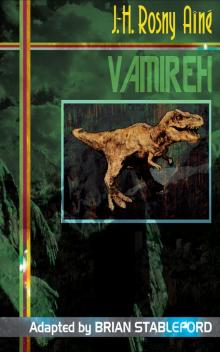 Vamireh
Vamireh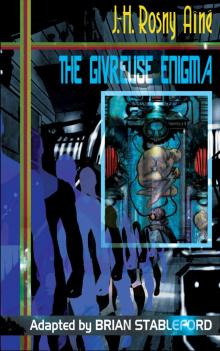 The Givreuse Enigma
The Givreuse Enigma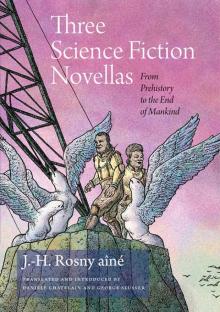 Three Science Fiction Novellas: From Prehistory to the End of Mankind
Three Science Fiction Novellas: From Prehistory to the End of Mankind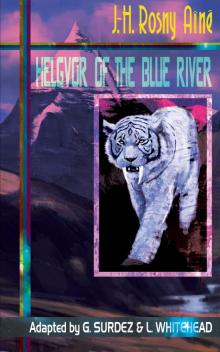 Helgvor of the Blue River
Helgvor of the Blue River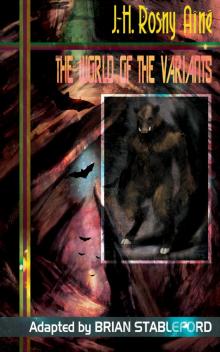 The World of the Variants
The World of the Variants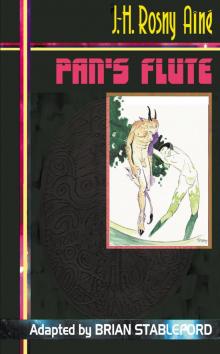 Pan's Flute
Pan's Flute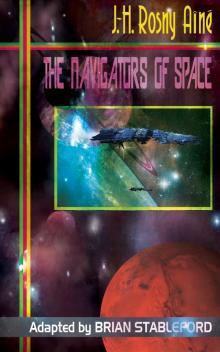 The Navigators of Space
The Navigators of Space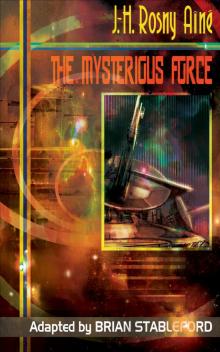 The Mysterious Force
The Mysterious Force